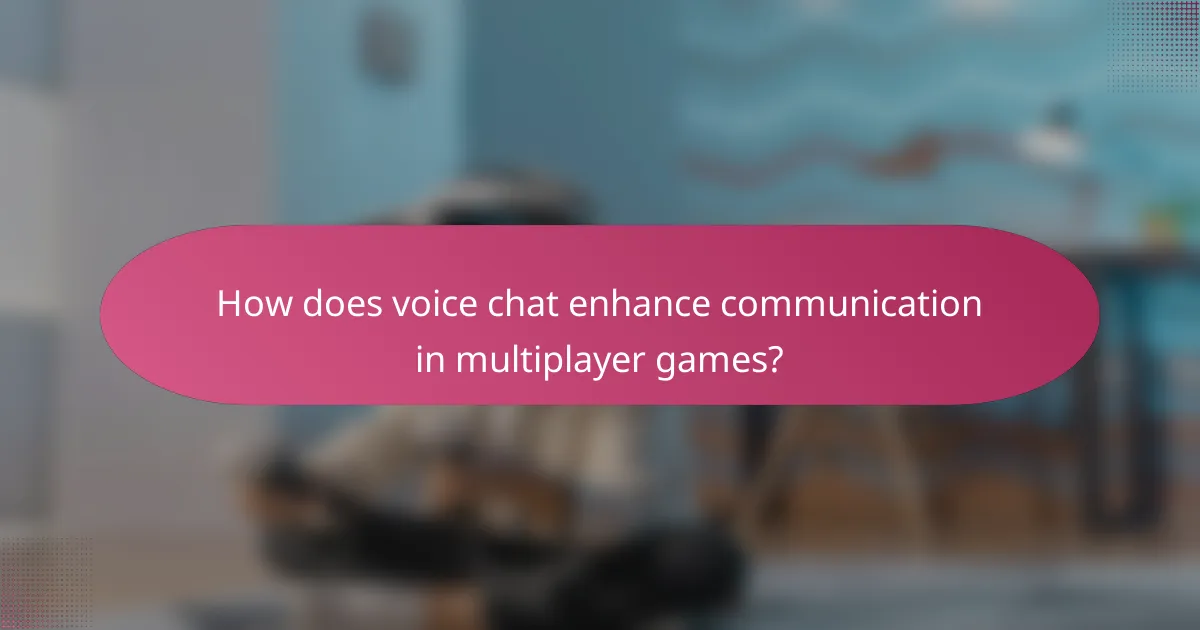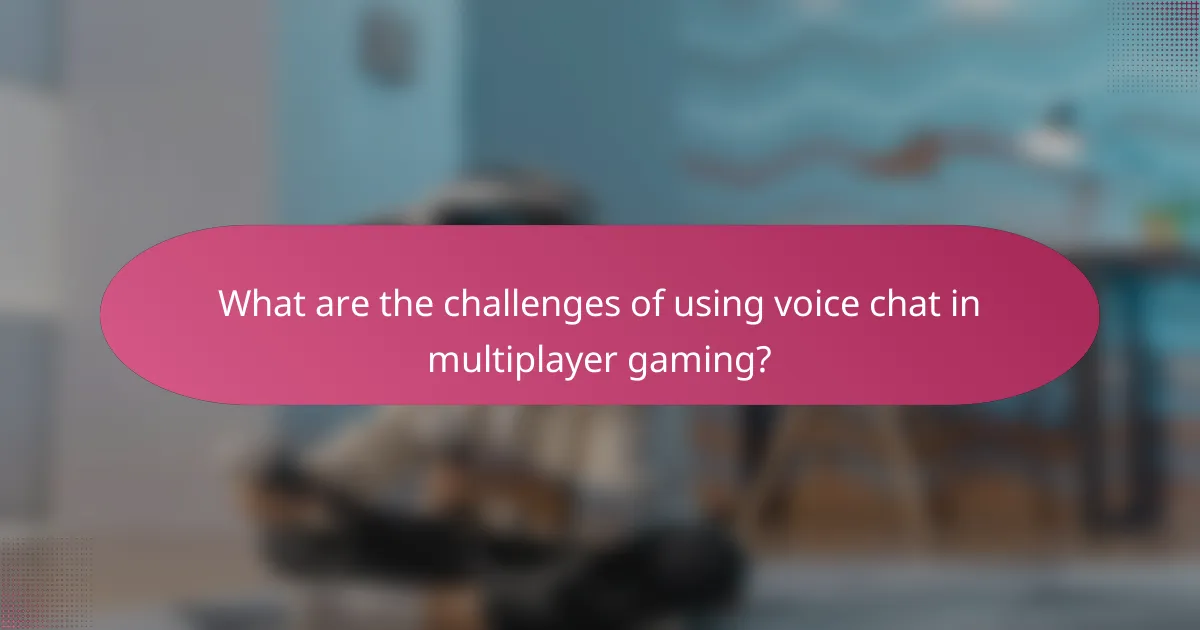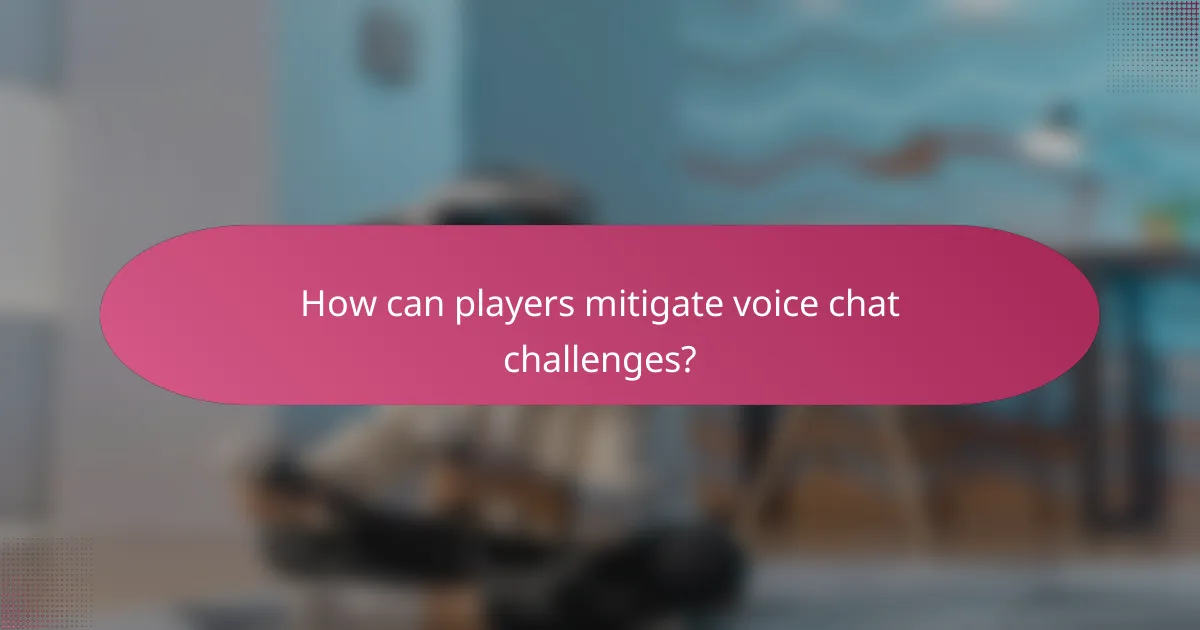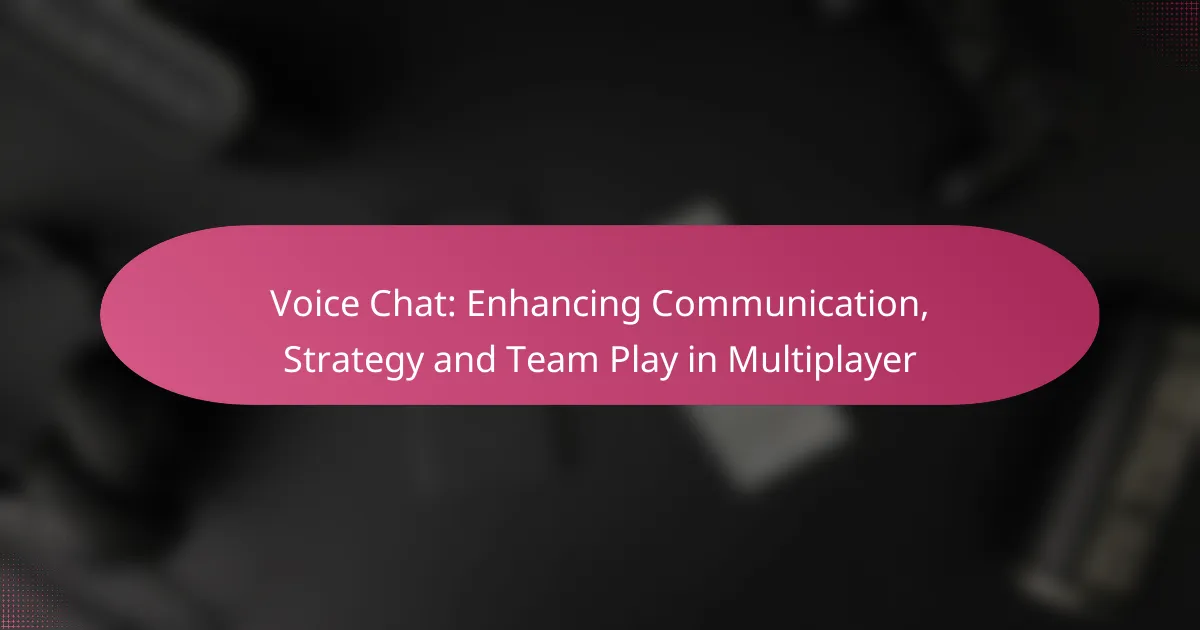Voice chat has become an essential tool in multiplayer gaming, enhancing communication by enabling players to share information swiftly and clearly. This real-time interaction not only improves teamwork but also allows for more effective strategy execution, ultimately elevating the overall gaming experience.

How does voice chat enhance communication in multiplayer games?
Voice chat significantly enhances communication in multiplayer games by allowing players to convey information quickly and clearly. This real-time audio interaction fosters better teamwork and strategy execution, leading to improved overall gameplay experiences.
Real-time interaction
Real-time interaction through voice chat enables players to communicate instantly, which is crucial during fast-paced gaming scenarios. Unlike text chat, which can introduce delays, voice communication allows for immediate responses, helping teams react swiftly to in-game events.
For example, when a player spots an enemy, they can quickly alert their teammates, allowing for coordinated attacks or defensive maneuvers. This immediacy can be the difference between winning and losing a match.
Improved team coordination
Voice chat enhances team coordination by facilitating clearer strategic discussions. Players can share their plans and roles in real-time, ensuring everyone is on the same page regarding objectives and tactics.
Using voice chat, teams can efficiently assign tasks, such as who will defend a position or who will scout ahead. This clarity reduces confusion and helps maintain a unified approach during gameplay.
Reduced communication barriers
Voice chat reduces communication barriers that often arise from language differences or typing speed limitations. Players can express themselves verbally, which can be more effective than trying to convey complex ideas through text.
This is particularly beneficial in international gaming communities where players may speak different languages. Voice chat allows for a more natural flow of conversation, making it easier to collaborate and build camaraderie among diverse teams.

What are the best voice chat platforms for multiplayer gaming?
The best voice chat platforms for multiplayer gaming include Discord, TeamSpeak, and Mumble. Each platform offers unique features and capabilities that cater to different gaming needs and preferences.
Discord
Discord is a widely-used voice chat platform known for its user-friendly interface and robust features. It allows players to create servers, organize channels, and communicate via voice, video, and text, making it versatile for various gaming communities.
One of Discord’s key advantages is its integration with games and other applications, enabling seamless communication while playing. Additionally, it offers free access with optional paid features, making it accessible for casual and serious gamers alike.
TeamSpeak
TeamSpeak is a long-standing voice chat solution favored by competitive gamers for its low latency and high-quality audio. It operates on a client-server model, which means users need to connect to a server to communicate, providing more control over the environment.
While TeamSpeak requires a bit more technical setup compared to Discord, it offers extensive customization options and security features. Users can host their own servers, which can be beneficial for teams that prioritize privacy and control over their communication channels.
Mumble
Mumble is an open-source voice chat platform that emphasizes low latency and high-quality sound. It is particularly popular among gamers who require real-time communication, such as in tactical games where timing is crucial.
One of Mumble’s standout features is its positional audio, which allows users to hear other players based on their in-game location. This can enhance immersion and strategy during gameplay. However, Mumble may require some technical knowledge to set up effectively, which could be a barrier for less experienced users.

How can voice chat strategies improve team play?
Voice chat strategies can significantly enhance team play by fostering clear communication and coordination among players. Effective use of voice chat allows teams to share information quickly, make strategic decisions, and respond to dynamic situations in real-time.
Establishing roles
Establishing roles within a team is crucial for effective communication during gameplay. Each player should have a defined role, such as leader, scout, or support, which helps streamline decision-making and reduces confusion. For example, a designated leader can focus on strategy while others execute specific tasks based on their roles.
To implement this, teams should discuss and agree on roles before starting a match. This clarity allows players to communicate more effectively, as they know who is responsible for what during critical moments.
Effective callouts
Effective callouts are essential for conveying important information quickly. Players should develop a standardized system for callouts that includes locations, enemy positions, and strategic points of interest. For instance, using map coordinates or common landmarks can help ensure everyone understands the context of the callout.
To improve callout efficiency, practice using concise language and avoid jargon that may confuse teammates. Regularly reviewing and refining callout terminology can enhance clarity and speed during high-pressure situations.
Strategic planning
Strategic planning involves discussing tactics and objectives before engaging in gameplay. Teams should outline their approach, including offensive and defensive strategies, to ensure everyone is on the same page. This preparation allows for quicker adjustments during matches as players are already familiar with the overall game plan.
During strategic discussions, consider using visual aids like maps or diagrams to illustrate tactics. Additionally, regularly revisiting and adapting strategies based on past performance can lead to continuous improvement and better teamwork.

What are the key features to look for in voice chat software?
When selecting voice chat software for multiplayer gaming, prioritize low latency, cross-platform compatibility, and customizable settings. These features enhance communication, streamline strategy, and improve team play, ensuring a seamless gaming experience.
Low latency
Low latency is crucial for effective voice communication in multiplayer games. Ideally, latency should be under 100 milliseconds to prevent noticeable delays that can disrupt gameplay. Look for software that uses efficient codecs and optimized servers to minimize lag.
To assess latency, consider using tools that measure ping times during gameplay. A good voice chat solution should maintain consistent performance even during peak usage times, ensuring that all players can communicate in real-time.
Cross-platform compatibility
Cross-platform compatibility allows players on different devices to communicate seamlessly. Whether using a PC, console, or mobile device, the software should support various operating systems and hardware configurations. This feature is essential for teams with diverse setups.
Check if the voice chat software integrates with popular gaming platforms like Steam, Xbox Live, or PlayStation Network. This ensures that players can connect without needing to switch applications or devices, fostering better teamwork and strategy execution.
Customizable settings
Customizable settings enable users to tailor the voice chat experience to their preferences. Look for options to adjust microphone sensitivity, speaker volume, and audio quality. These adjustments can help optimize communication based on individual setups and environments.
Additionally, consider software that allows users to create custom channels or groups. This feature is particularly useful for organizing team strategies or coordinating with friends, enhancing overall gameplay efficiency and enjoyment.

What are the challenges of using voice chat in multiplayer gaming?
Using voice chat in multiplayer gaming presents several challenges, including background noise, technical issues, and player toxicity. These factors can hinder effective communication and negatively impact the overall gaming experience.
Background noise
Background noise can significantly disrupt voice communication in multiplayer games. Sounds from the environment, such as music, conversations, or even pets, can interfere with clarity and make it difficult for players to hear each other. Players should consider using noise-canceling microphones or adjusting their settings to minimize these distractions.
To mitigate background noise, players can also choose quieter environments for gaming sessions. Additionally, many voice chat applications offer noise suppression features that can help filter out unwanted sounds, enhancing the overall communication experience.
Technical issues
Technical issues, such as latency, connectivity problems, and software glitches, are common challenges in voice chat for multiplayer gaming. High latency can lead to delays in communication, making it hard for teams to coordinate effectively. Players should ensure they have a stable internet connection and consider using wired connections for better reliability.
Regularly updating voice chat software and checking audio settings can help prevent technical glitches. Players should also familiarize themselves with troubleshooting steps, such as restarting the application or adjusting audio input/output settings, to resolve issues quickly.
Player toxicity
Player toxicity can create a hostile environment in multiplayer gaming, often manifesting through harassment or negative behavior in voice chat. This can discourage effective communication and teamwork, leading to a poor gaming experience. Players should be aware of the potential for toxicity and take steps to foster a positive atmosphere.
To combat toxicity, players can use mute options or report abusive behavior to game moderators. Establishing clear communication guidelines within teams can also promote respectful interactions, helping to maintain a more enjoyable gaming experience for everyone involved.

How can players mitigate voice chat challenges?
Players can mitigate voice chat challenges by utilizing effective tools and establishing clear guidelines. These strategies enhance communication and reduce disruptions during multiplayer sessions.
Using noise suppression tools
Noise suppression tools help filter out background sounds, ensuring clearer communication among players. Many gaming platforms offer built-in options or support third-party software that can significantly reduce unwanted noise.
When selecting noise suppression tools, consider the type of environment you play in. For instance, if you are in a noisy area, tools that provide real-time noise cancellation can be particularly beneficial. Popular options include software like Krisp or RTX Voice, which can be easily integrated into most setups.
Setting up moderation protocols
Establishing moderation protocols is crucial for maintaining a respectful and productive voice chat environment. This can include setting rules for communication, such as avoiding offensive language and ensuring everyone has a chance to speak.
To implement effective moderation, designate specific players as moderators who can enforce the rules and manage conflicts. Additionally, consider using tools that allow players to mute or report disruptive individuals, fostering a more enjoyable gaming experience for everyone involved.

What are the benefits of subscription-based voice chat services?
Subscription-based voice chat services offer enhanced communication, improved team coordination, and access to advanced features that free alternatives often lack. These services typically provide clearer audio quality, lower latency, and additional functionalities that can significantly enhance multiplayer gaming experiences.
Improved Audio Quality
Subscription-based voice chat services often utilize higher bitrate audio codecs, resulting in clearer sound and reduced background noise. This improvement allows players to communicate more effectively, especially in fast-paced games where every second counts. Users can expect a more immersive experience, as clear audio enhances situational awareness.
Lower Latency
Many subscription services prioritize low latency connections, which is crucial for real-time communication during gameplay. Lower latency means that voice transmission occurs almost instantaneously, reducing the chances of miscommunication. This is particularly beneficial in competitive gaming scenarios where timing is critical.
Advanced Features
Subscription-based services often come with a range of advanced features, such as customizable channels, enhanced security options, and integration with other gaming platforms. For example, users might have the ability to create private channels for team discussions or utilize push-to-talk features to minimize background noise. These tools can streamline communication and improve overall team strategy.
Cost Considerations
While subscription fees can vary, they typically range from a few dollars to around ten dollars per month, depending on the service and features offered. Players should weigh the cost against the benefits of improved communication and gameplay experience. Many services offer free trials, allowing users to assess the value before committing financially.
Community and Support
Subscription-based voice chat services often provide access to dedicated customer support and active user communities. This can be invaluable for troubleshooting issues or sharing tips with fellow gamers. Engaging with a community can enhance the overall gaming experience, as players can exchange strategies and build camaraderie.
